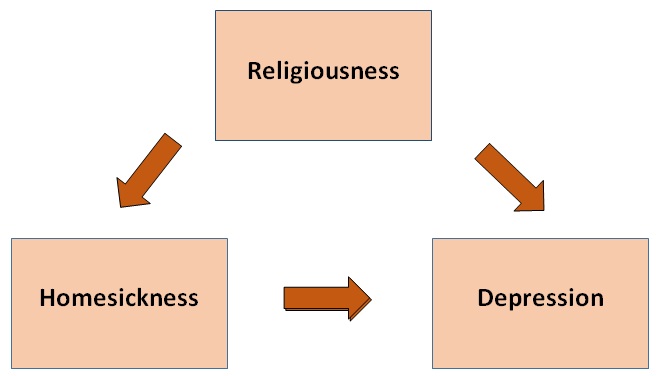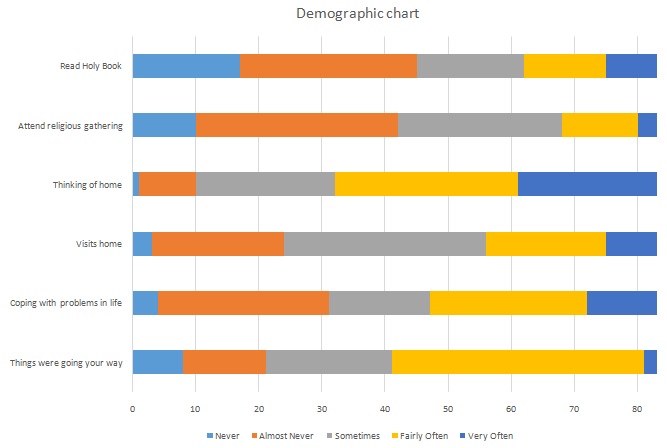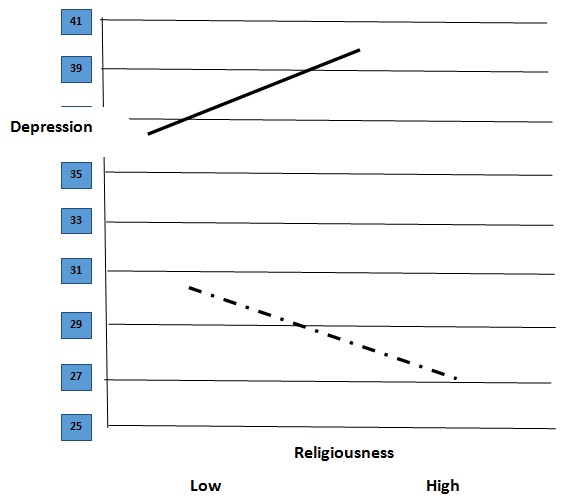Homesickness in college students: the role of religion in combating depression
Homesickness is the distress or impairment caused by an actual or anticipated separation from home. Homesickness is an issue that affects number of college students where college students living far from home suffer from depression and various forms of depression. The transition to college or university can be an exciting new experience for many young adults. For some, intense homesickness can make this move difficult, even unsustainable. Homesickness-defined as the distress or impairment caused by an actual or anticipated separation from home-carries the unique hallmark or preoccupying thoughts of home and attachment of objects. Suffers of homesickness report depression and anxiety and usually display withdrawn behavior. They also have difficulty focusing on topics unrelated to home. This problematic situation can lead to new mental and physical problems and sometimes lead to withdrawal from school.
Religiousness, the belief in and reverence for a supernatural power or powers, regarded as creating and governing the universe, has been defined differently across different studies and the extent of the impact of religion on one's basic life varies from one study to another. It has acted as a buffer against a variety of health and adjustment outcomes.
The focus of this current study is to determine how religiousness is related to homesickness and depression. It also investigates the part it plays in combatting depression resulting from homesickness.
Hypothesis
We hypothesized that religiousness will moderate the relationship between homesickness and depression.
Method
Participants
Participants were 83 (50 male, 33 female) students ranging from freshmen to seniors. Of the 83 participants, 7% were of the age group 15-17 while 65% of the participants were of the age group 18-20 while 28% of the participantswereof the age group 21-23. Religions of the participants varied from Islam to Hinduism, Islam beimg the dominant of them all.In terms of family structure, 80% of the participants lived in a nuclear family while only 20% of the participants didn't.
Measures
Religiousness: Religious was assessed using the five point likert scale where participants had to select options ranging from never to very often. Questions were asked to determine the level of religiousness pertaining to different to individuals. In order to investigate the level of religiousness questions such as 'How often do you pray privately in places other than the mosque/church/temple?' and 'How often do you attend religious gatherings?' along with asking if they believed in a God who watched over them. Questions such as reading of their Holy Book in the last six months were also asked to determine how religious they were.
Homesickness. Homesickness was determined using the 5-point likert scale with 1 being 'Never and 5 being 'Very often' with higher scores indicating more symptoms of homesickness. The two questions 'I hardly visit home during the semester break' and 'I rarely call home' were replaced by 'How often do you go home?' and 'How often do you call home?' to prevent bias of any sort.
Depression. Depression was measured by the 5-point likert scale too where the participants were asked about their thoughts and feelings with statements during the last month such as 'How often have you felt that things were going your way?' and 'How often have you found that you could not cope with all the things that you had to do?' Questions were also asked to determine their social life and their personality according to their friends.
Procedure
Participants were asked to fill the questionnaire which was posted on the facebook group and sent to them through mail. Some were interviewed too while others were given hard copies to fill the survey. All 83 participants completed all measures.
Data analytic strategy

Figure 1 Relationship between religiousness, homesickness and depression
Means of study variables
|
Variables
|
Positive variation
|
Negative variation
|
|
Religiousness
|
54.17
|
28.33
|
|
Depression
|
55
|
28
|
|
Homesickness
|
46
|
40.33
|


LIMITATIONS
All data collected from censuses and surveys will have errors. Errors are inevitable in any survey. However, our ethical code requires us to be honest about the limitations of our data/survey. Some of the limitations that we faced while conducting research for this project were
Random errors are the most common and unavoidable kind of limitation in a survey research. These occur because of natural and uncontrollable variations in the survey process, i.e., the mood of the respondent.
Errors made during collection and analysis of data. For example, overlooking of some responses while compiling results.
- Respondent errors
- Misrepresentation through carelessness of the respondent when filling out the questionnaire would result in inaccurate data accumulation
- Unacceptable responses by people who filled out the questionnaire for fun and took it as a joke.
Though we tried our best to oversample, undercounting might have occurred in the form that some minority religion groups might have been omitted, like Zoroastrianism, etc.
Some accidental bias in the sampling may have occurred as we only surveyed the students away from home who were in living in the hostels. Students living in their own accommodations or with relatives were not taken into consideration.
RESULTS
After careful consideration of the survey results, the conclusion was reached that students who are more in touch with their religion are less likely to be depressed and homesick.